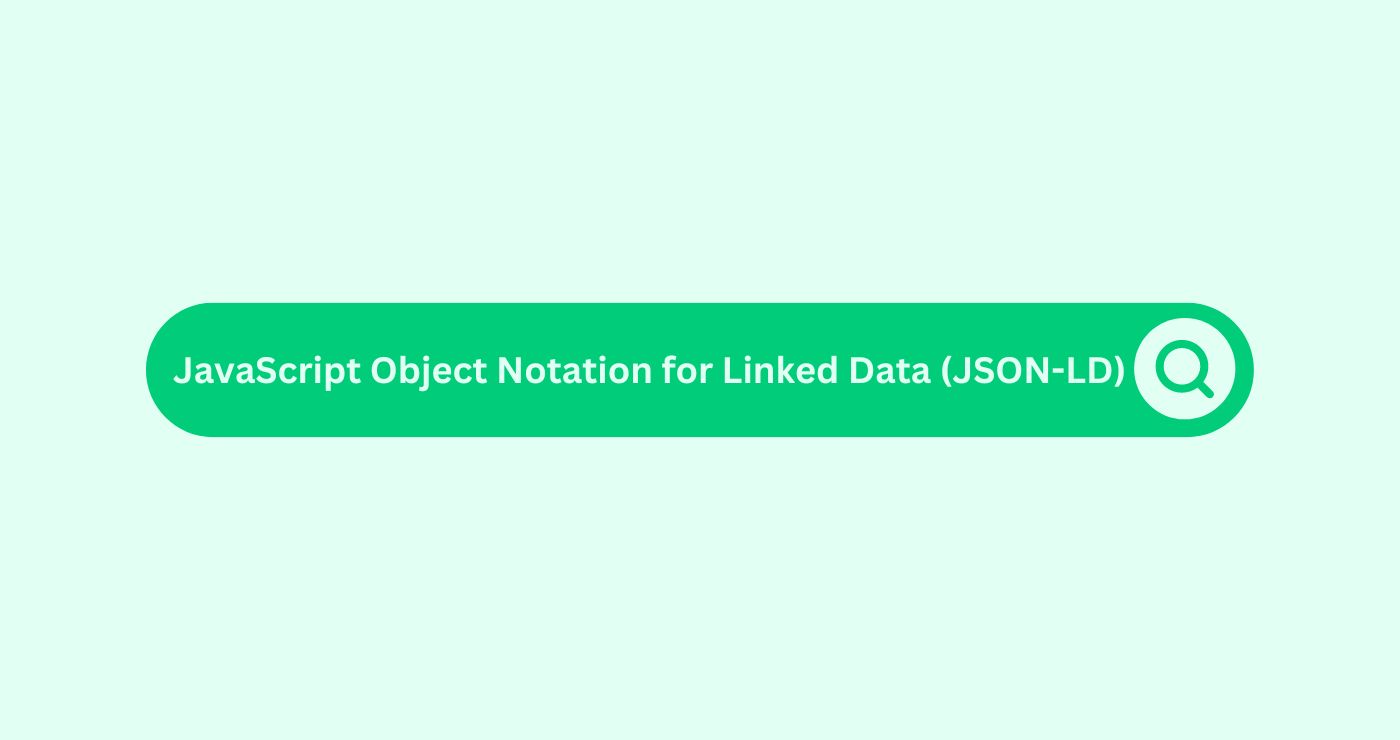Definition
JavaScriptDefinition JavaScript is a versatile programming language co... More Object Notation for Linked Data (JSON-LD) is a lightweight Linked Data format. It is designed to be easy to read and write, using a JSON-based syntax to encode Linked Data in a manner that is easily consumable by web services. JSON-LD allows the embedding of context-based data within JSON, enabling data interoperability across different systems and platforms. By incorporating context, JSON-LD ensures that data attributes are semantically disambiguated, facilitating a more accurate interpretation and linkage of data across diverse datasets.
JSON-LD is crucial for search engine optimisationDefinition of Search Engine Optimisation Search Engine Optim... More (SEO), as it helps search engines better understand the content on a web page. This structured dataDefinition Structured Data refers to a standardized format f... More format enables the inclusion of rich snippetsDefinition Rich snippets are enhanced search results that pr... More in search results, enhancing the visibility and attractiveness of a site. JSON-LD is particularly useful for specifying metadata about entities, including people, places, products, and events, thus improving the way information is indexed and retrieved by search engines.
How you can use JavaScript Object Notation for Linked Data (JSON-LD)
Example Use in SEO
To implement JSON-LD for SEO, consider the following example of a business listing: This snippet provides structured dataDefinition Structured Data refers to a standardized format f... More that search engines can use to display detailed information in search results.
jsonCopy code{
"@context": "http://schema.org",
"@type": "LocalBusiness",
"name": "John's Coffee Shop",
"image": "http://example.com/logo.jpg",
"address": {
"@type": "PostalAddress",
"streetAddress": "123 Main St",
"addressLocality": "Anytown",
"addressRegion": "CA",
"postalCode": "90210",
"addressCountry": "US"
},
"geo": {
"@type": "GeoCoordinates",
"latitude": "34.0522",
"longitude": "-118.2437"
},
"url": "http://www.johnscoffeeshop.com",
"telephone": "+1-800-555-1234",
"openingHours": "Mo-Sa 08:00-18:00",
"priceRange": "$$"
}
This JSON-LD snippet provides search engines with detailed information about John’s Coffee Shop, including its name, address, geographic coordinates, URL, phone number, opening hours, and price range. By embedding this JSON-LD within the HTML of a web page, search engines can extract this data and use it to create rich, informative snippetsDefinition Snippets in email marketing refer to small, reusa... More that appear in search results.
Calculating with JSON-LD
In some cases, you might need to calculate certain values dynamically to include them in your JSON-LD. For example, you could use JavaScriptDefinition JavaScript is a versatile programming language co... More to calculate the average rating from customer reviews and then embed this dynamically calculated value into your JSON-LD script.
htmlCopy code<script>
const reviews = [
{ rating: 4 },
{ rating: 5 },
{ rating: 3 },
{ rating: 4 }
];
const avgRating = reviews.reduce((acc, review) => acc + review.rating, 0) / reviews.length;
const jsonLdScript = {
"@context": "http://schema.org",
"@type": "LocalBusiness",
"name": "John's Coffee Shop",
"aggregateRating": {
"@type": "AggregateRating",
"ratingValue": avgRating,
"reviewCount": reviews.length
}
};
document.getElementById('json-ld').textContent = JSON.stringify(jsonLdScript);
</script>
<script id="json-ld" type="application/ld+json"></script>
In this example, we calculate the average rating from a set of reviews and embed it within the JSON-LD script dynamically, ensuring the structured dataDefinition Structured Data refers to a standardized format f... More is always up-to-date with the latest review information.
Key Takeaways
- Enhanced SEO: JSON-LD improves search engine understanding of web page content, leading to better indexingWhat is Indexing? Indexing in the context of SEO refers to t... More and richer search results.
- Easy Implementation: JSON-LD is embedded directly into HTML, making it straightforward to add structured dataDefinition Structured Data refers to a standardized format f... More to a web page.
- Interoperability: JSON-LD provides a standardized way to represent linked data, facilitating data exchange between different systems.
- Flexibility: JSON-LD can be used to describe a wide range of entities, including businesses, products, events, and more.
- Improved User Experience: By providing rich snippetsDefinition Rich snippets are enhanced search results that pr... More in search results, JSON-LD can make web pages more attractive and informative to users.
FAQs
What is JavaScript Object Notation for Linked Data (JSON-LD)?
JSON-LD is a lightweight format for encoding Linked Data using JSON, enabling better data interoperability and enhanced SEO.
How does JSON-LD help with SEO?
JSON-LD provides structured dataDefinition Structured Data refers to a standardized format f... More that search engines use to generate rich snippetsDefinition Rich snippets are enhanced search results that pr... More, improving visibility and click-through rates.
Can I dynamically generate JSON-LD content?
Yes, you can use JavaScriptDefinition JavaScript is a versatile programming language co... More to dynamically generate JSON-LD content based on real-time data.
Where should I place JSON-LD in my HTML?
JSON-LD should be placed within a tag in the section or at the end of the section of your HTML document.
Is JSON-LD supported by all search engines?
Most major search engines, including Google, Bing, and Yahoo, support JSON-LD.
6. Can JSON-LD be used for all types of content?
Yes, JSON-LD is versatile and can be used to describe various types of content, such as articles, products, events, and organizations.
What is the purpose of the "@context" property in JSON-LD?
The "@context" property defines the schema and vocabulary used, providing context to the data attributes.
How do I test my JSON-LD implementation?
You can use Google's Structured DataDefinition Structured Data refers to a standardized format f... More Testing Tool to validate your JSON-LD implementation and ensure it is correctly formatted.
Can JSON-LD improve local SEO?
Yes, JSON-LD can significantly enhance local SEOWhat is Local SEO? Local SEO refers to the process of optimi... More by providing detailed information about local businesses, such as address, opening hours, and contact details.
Is it necessary to update JSON-LD frequently?
Yes, to maintain accurate and up-to-date information, especially for dynamic contentDefinition Dynamic Content refers to web content that change... More like reviews or events, updating JSON-LD is important.




